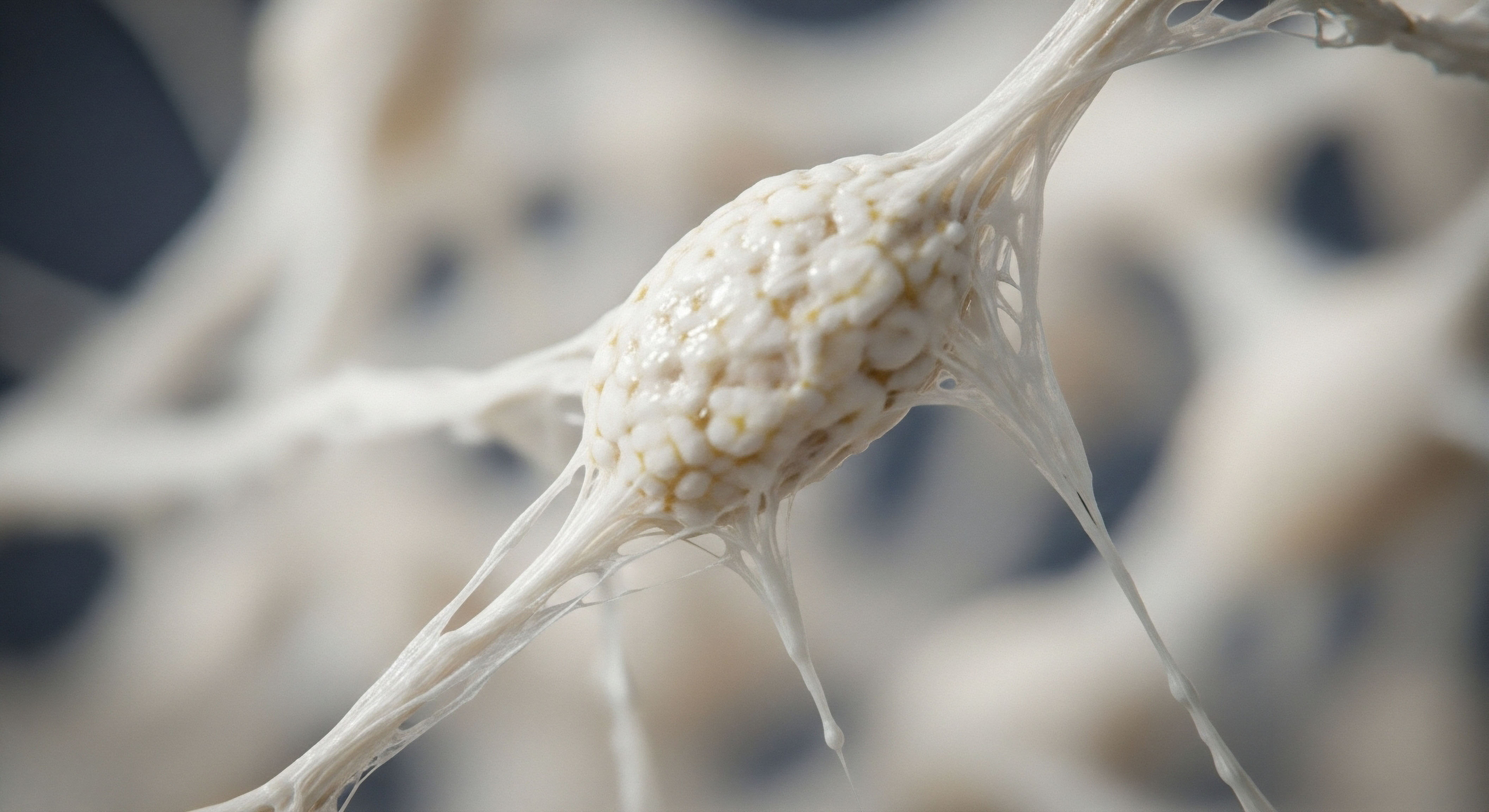

Your Hardware Is Only as Good as Its Operating System
You feel the resistance. A subtle friction in the system that manifests as a plateau in the gym, a fog that dulls cognitive acuity, or a recovery that takes just a little too long. The conventional approach directs your attention to the machinery ∞ the muscles, the bones, the cardiovascular engine.
This mechanical view of the human body, a perspective of levers and pulleys, has reached the limits of its utility. True human performance, the kind that defines your capacity for impact, energy, and resilience, originates from a much deeper stratum of biology. The ultimate frontier of your potential is written in the operational code of your cells.
Your body is a network of trillions of individual units, each executing a precise set of instructions. These cellular directives govern everything from metabolic efficiency to the speed of neural transmission. Physical output is a direct consequence of this microscopic world. When the communication within and between these cells is pristine, the system performs with seamless power.
When the signals become corrupted by biological noise, the entire apparatus lags. This is the central principle of a new performance doctrine. We are moving from an era of mechanical tinkering to one of cellular architecture.
This shift redefines our relationship with the aging process. The gradual decline in vitality is a function of accumulating cellular dysregulation. The accumulation of senescent cells, for instance, actively disrupts tissue function and promotes a state of low-grade, chronic inflammation. This internal static degrades performance from the inside out.
Understanding this allows you to reframe the objective. The goal becomes the systematic optimization of your cellular environment, targeting the foundational processes that dictate your biological age and functional capacity. You are the system administrator of your own biology.
Thinking in this way moves you from a reactive posture to a position of proactive control. Performance blockers like fatigue and cognitive slowdown are seen for what they are ∞ data points indicating specific inefficiencies in the cellular operating system.
A decline in mitochondrial function directly translates to reduced energy production and increased oxidative stress, which manifests as physical and mental fatigue. Addressing the root cause within the cellular powerhouse offers a more fundamental path to restoring output. This perspective provides a blueprint for building a more resilient, high-performing biological machine, one capable of executing your ambitions with precision and power for decades to come.


Recalibrating the Cellular Engine
Achieving mastery over your biological system requires a precise understanding of its core subroutines. The process is akin to tuning a high-performance engine, where the objective is to optimize fuel combustion, clear exhaust, and ensure flawless communication between all components. Your cellular machinery operates on similar principles.
By targeting three foundational pillars ∞ mitochondrial health, cellular maintenance, and signal integrity ∞ you can systematically upgrade your body’s entire operating system for sustained peak performance. This is the practical application of cellular-centric biology.

Mitochondrial Optimization the Power Plants
Your capacity for any action, physical or mental, is directly coupled to the energy-producing capability of your mitochondria. These organelles are the power plants within every cell, converting raw nutrients into adenosine triphosphate (ATP), the universal currency of biological energy. With age and exposure to stressors, mitochondrial function declines. This degradation means less available ATP, which the body experiences as fatigue, reduced strength, and slower cognitive processing. Optimizing these power plants is the first principle of cellular performance.
The process begins with providing the mitochondria with the specific raw materials they need for efficient energy conversion. This involves a nutritional strategy focused on compounds that directly support the electron transport chain, the primary mechanism of ATP production. A strategic intake of these key nutrients enhances the efficiency of your cellular power grids.
Secondly, targeted physical activity protocols send a powerful signal for mitochondrial biogenesis, the creation of new, more efficient mitochondria. The body adapts to consistent energy demands by building a more robust power infrastructure. This two-pronged approach ensures your cells have both the machinery and the fuel to meet high-performance demands.
As organisms age, mitochondria exhibit increased vulnerability to structural alterations, which impairs their performance largely due to oxidative damage and contributes to the overall aging process.

Cellular Maintenance Decommissioning the Defunct
A high-performance system is defined as much by its efficiency in removing waste as it is by its productive output. Your body contains a sophisticated quality control and disposal system known as autophagy, which identifies and removes damaged or dysfunctional cellular components.
A parallel process deals with entire cells that have reached a state of irreversible growth arrest, a condition called senescence. These senescent cells, sometimes called “zombie cells,” cease to perform their duties yet resist the normal process of cellular death.
Their accumulation is a primary driver of age-related performance decline. Senescent cells secrete a cocktail of inflammatory molecules that create a toxic microenvironment, degrading the function of nearby healthy cells and contributing to systemic inflammation. This creates a constant, low-level drain on your system’s resources and disrupts tissue homeostasis.
Actively supporting the body’s natural clearance pathways is therefore a critical intervention. This can be influenced through protocols like intermittent fasting, which has been shown to upregulate autophagy, giving your cells a dedicated period to conduct repairs and clear out debris. Certain compounds found in nature also support this cellular housekeeping, helping to manage the senescent cell burden and reduce the inflammatory noise that compromises system-wide performance.

Signal Integrity the Communication Network
Your body is a vast communication network. Hormones, neurotransmitters, and other signaling molecules act as data packets, transmitting instructions that coordinate complex biological functions. The integrity of these signals determines the precision of the system’s response. Oxidative stress, an imbalance between free radicals and the body’s ability to neutralize them, corrupts these signals.
The modern view of this process points to a progressive loss of “redox resilience,” meaning the system becomes less able to manage these fluctuations, leading to disruptions in cellular communication.
A specific example of this occurs in the brain. The excitability of neurons, which is fundamental to learning and memory, is modulated by cellular mechanisms like the postburst afterhyperpolarization (AHP). Research shows that maintaining this cellular signaling process in a “young-like” state is a critical factor in successfully encoding new memories.
When these intricate signals are preserved, cognitive performance remains sharp. The strategy for maintaining signal integrity involves two key areas. First, reducing the sources of oxidative stress through lifestyle and nutrition. Second, bolstering the body’s endogenous antioxidant systems with specific precursors, such as cysteine, that are essential for producing the master antioxidant glutathione. This protects the fidelity of the data being transmitted throughout your biological network, ensuring that instructions are sent, received, and executed with clarity and precision.
-

Mitochondrial Support
This protocol focuses on enhancing the energy output of your cells. Key inputs like Coenzyme Q10 directly participate in the electron transport chain, improving the efficiency of ATP synthesis. The objective is to increase the baseline energy available for all physical and cognitive tasks.
-

Senescent Cell Management
This approach aims to reduce the inflammatory burden caused by dysfunctional cells. By supporting autophagic processes through timed nutrition and targeted phytonutrients, the system can more effectively clear out cellular debris. The result is a reduction in systemic “static” and improved tissue function.
-

Redox System Fortification
This strategy is designed to protect the integrity of cellular communication. By supplying the building blocks for the body’s primary antioxidant defenses, it helps maintain the delicate balance required for clear signaling. This directly supports everything from hormonal balance to neuronal function.


Activating the Blueprint for a New Timeline
The transition to a cellular performance model is initiated by biological signals. These are the moments when mechanical adjustments yield diminishing returns. You may notice a persistent cognitive fog that no amount of sleep can clear, a physical recovery that lags days behind your training load, or a general sense of decreased energetic output.
These are indicators that the system’s core programming requires attention. This is the moment to shift the focus inward, from the hardware to the operating system. It represents a pivot from forcing adaptation to enabling it from the ground up.
The timeline for experiencing the effects of this recalibration unfolds in distinct phases, mapping directly to the biological systems being optimized. The initial changes are often perceived in the domain of energy and cognition. Within the first several weeks of optimizing mitochondrial inputs and managing oxidative stress, individuals typically report more stable energy levels throughout the day and a noticeable improvement in mental clarity.
This corresponds to more efficient ATP production and a reduction in the inflammatory signals that can cloud neural function. Your brain and body are receiving cleaner fuel and operating in a less noisy environment.
Following this initial phase, structural and performance-based changes become more apparent. Improvements in body composition, exercise recovery, and resilience to physical stressors emerge as cellular maintenance pathways become more efficient. With a reduced burden of senescent cells and enhanced autophagy, the body can allocate more resources to repair and adaptation.
This is when training plateaus are broken and the body’s capacity for work fundamentally increases. Your system is not just running better; it is now rebuilding itself with higher-quality components.
A crucial factor in successfully encoding declarative memories is dependent on maintaining the intrinsic excitability of hippocampal pyramidal neurons by keeping the postburst AHP of these neurons in a ‘young-like’ state.
The long-term horizon is where the most profound effects are realized. Consistent application of cellular optimization principles alters the trajectory of biological aging. By addressing the root drivers of decline ∞ mitochondrial decay, senescent cell accumulation, and signal corruption ∞ you are doing more than just improving current performance.
You are architecting a biological system that maintains a higher level of function for a longer period. This is the ultimate payoff ∞ a healthspan that matches your lifespan, where vitality and capacity are preserved not by chance, but by deliberate, intelligent design. This is when you are no longer just participating in your life; you are actively directing its biological narrative.

The Command Line of Your Biology
You now possess the conceptual framework to interface with your body on a new level. The language of performance is shifting from the mechanical to the cellular, from the macro to the micro. This knowledge grants you a new form of agency.
It moves you from being a passenger in your own biology to being the architect at the helm. Every choice, from what you eat to how you train to when you rest, becomes a precise input into your cellular operating system. You are no longer just managing symptoms; you are editing source code. This is the future of personal potential, and you are holding the keyboard.



